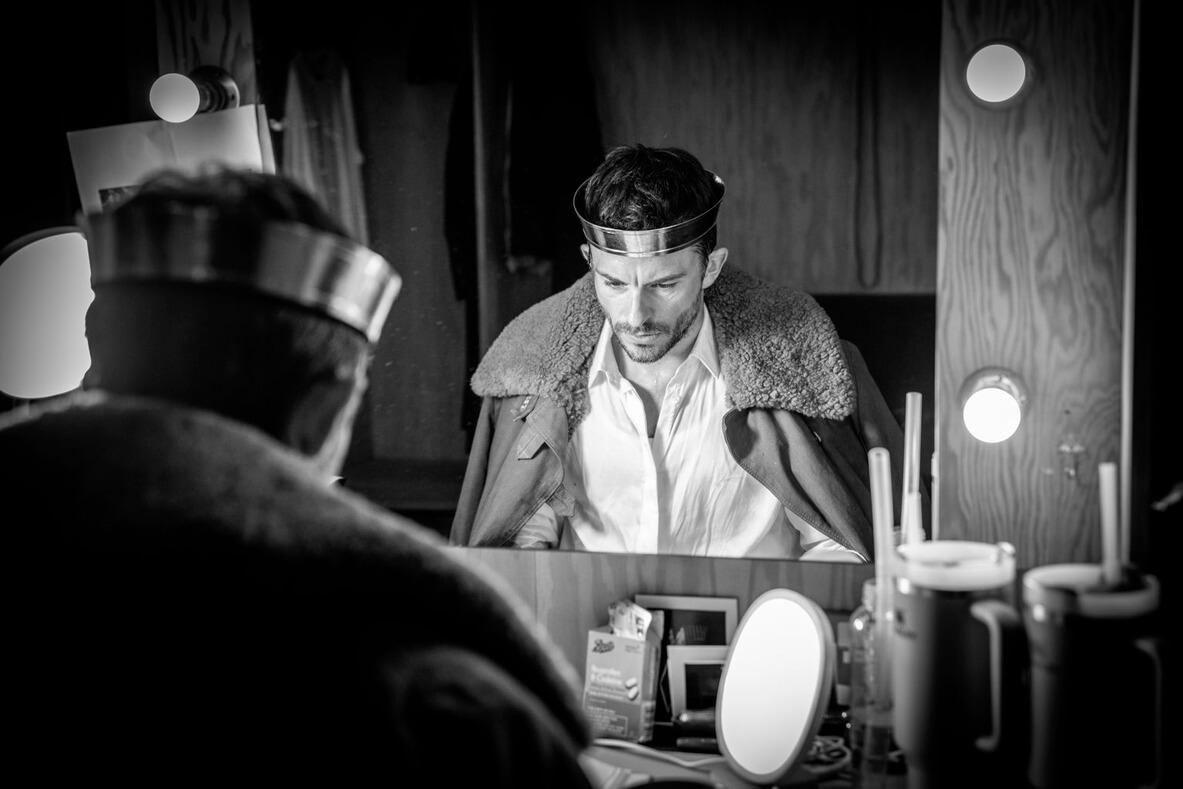A cavernous dark and gloomy set by Lizzie Clachen contains the skeleton of a West End drinking club from World War II London. Established in Soho by its formidable hard drinking proprietress as a place where people can forget their war time troubles, it attracts a bohemian crowd of artists, servicemen looking for illicit passion and general odd balls who relish the privacy it affords to be themselves in all their quirky, hard-drinking exuberant glory. At a time when homosexuality was illegal it’s also a rare oasis where gay men and women can bitch and flirt openly.
Over the course of three hours we watch a huge cast chip in beautifully edgy cameos as we eavesdrop on the late night heart-ache and debauchery, and the mechanics of keeping the place open in the face of police scrutiny, financial ruin, food rationing and bomb damage which means the building could collapse at any moment. In fact there’s a sense of doom about the entire venture over the four acts which chart the clubs demise from its murky heyday to its closure in the new dawn of peacetime and a labour victory which washes away the midnight misery of the blitz.
Veteran theatregoers like me will still relish the memory of Judy Dench as the clucking, fearsome, matriarchal, tabby cat of a landlady in a past and definitive National Theatre production which also featured June Brown (Dot Cotton from TV’s EASTENDERS) as her long suffering staff. On this occasion Kate Fleetwood plays a much sleeker, younger version of boss, Christine, glamorously navigating her way through a series of unfortunate, ill-fated romantic trysts and dodgy dealings through the fug of hard drinking. Her interpretation is very fine and still incorporates heartbreak and ill health on the road to ruin but I did miss the poignancy of a dowdier, middle aged woman in crisis.
The other central figure is Hugh Marriner, beautifully played by a seedily handsome Charles Edwards, a failing writer trying to keep his gay love life and finances on track, fuelled by whisky and cigarettes. He’s surrounded by delicious cameo performances from a huge cast that is almost too big to fit across the stage for the curtain call. Stand out performances include Danny Webb as the enigmatic, Austrian black-marketeer, Siegfried, Jenny Galloway as a fearsome lesbian literary critic and Sinead Matthews as fading glamour-puss, Elizabeth. She has the evening’s most heart wrenching moments when she discovers the fate of a friend in the Nazi concentration camps thanks to an aspiring photo-journalist's attempts to capture the contrasting world of Soho night life and holocaust horror.
Thankfully director Joe Hill-Gibbins has restrained his usual inclination to make shrill, ugly, attention seeking theatre, to serve Rodney Ackland’s play rather than his own reputation and it's a fascinating evening, particularly for anyone interested in British gay history. The swirling mass of dancing, and hedonistic exuberance remains intoxicating through-out, even if I'm not sure the play is meaty enough to warrant three hours of stage time. It would be just as powerful with 30 minutes shaved off.
An enthralling theatrical curiosity.

 The National Theatre could do with another hit following a few dodgy productions whilst it’s been shored up by recent sure-fire crowd pleasers AMADEUS and FOLLIES.
The National Theatre could do with another hit following a few dodgy productions whilst it’s been shored up by recent sure-fire crowd pleasers AMADEUS and FOLLIES.



 As supplies dwindle, a newly appointed New South Wales Governor is under pressure from his marines to maintain discipline among the convicts. He wrestles with his decision to allow a young lieutenant to direct a play to boost morale and keep their charges occupied.
As supplies dwindle, a newly appointed New South Wales Governor is under pressure from his marines to maintain discipline among the convicts. He wrestles with his decision to allow a young lieutenant to direct a play to boost morale and keep their charges occupied.